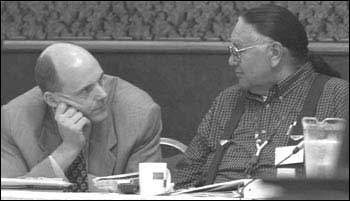















Successes in Stewardship: July 2002 |
|---|

|
Federal Highway Administration
July 2002
Respectful Communication Accelerates the Section 106 Process: Iowa's New Tribal Consultation Process

Iowa DOT Director Mark Wandro and Orville Little Owl of the Mandan Hunkpapa Lakota tribe
at the Tribal Summit on Historic Preservation and Transportation in May 2001. (Iowa DOT image)
| Impacts to cultural and historic resources must be considered during the NEPA process. Significant provisions governing tribal consultation are found in Section 106 of the National Historic Preservation Act (NHPA). In 1999, Congress modified the NHPA to include additional tribal consultation for Federal projects. The revised Section 106 regulations require agencies to consult with tribes that currently reside or have ancestral history in the project area. Determining how to identify affected tribes and initiate the consultation process can be difficult. FHWA's Native American Coordinator, Tim Penney, assists states in identifying and consulting with tribes and in developing an efficient consultation process that balances the varied tribal traditions and values. The first step toward finding common ground between transportation and cultural needs is understanding different tribal governments and respecting tribal sovereignty. |
Locating Tribes for ConsultationTribes with cultural or religious interests in a state may no longer live in the area. Project sponsors can use the Native American Consultation Database on the Bureau of Indian Affairs website www.cast.uark.edu/other/nps/nacd/ to locate tribes for project consultation. Project sponsors may also want to contact their state Indian Advisory Committee, Office of the State Archaeologist, and State Historic Preservation Officer for current tribal contact information and advice on how to communicate effectively with tribes. |
Tips for Consulting with TribesWhen consulting with tribes, keep the following in mind:
|
Iowa Develops Streamlined Tribal Consultation ProcessTo ensure efficient and effective compliance with tribal consultation requirements, Iowa needed to assess tribal interests in transportation coordination. With over 25 tribes having a current or historic interest in the state, this proved to be challenging. In May 2001, the FHWA Iowa Division and the Iowa Department of Transportation (DOT) partnered with the Iowa Office of the State Archaeologist and the Iowa State Historic Preservation Officer to host the Tribal Summit on Historic Preservation and Transportation. Representatives from transportation and historic agencies, universities, non-profits, and tribes discussed strategies for developing a streamlined consultation process. A follow-up workshop and site visit in October 2001 helped tribal representatives learn more about the transportation planning process and mitigation efforts for Section 106 resources. Bridging Cultural Gaps through Tribal SummitsThe Tribal Summit and follow-up workshop were integral steps in developing trust and building relationships with tribes. Both meetings were planned in coordination with a tribal representative to ensure that the agenda, format, and timeframes were appropriate. Several key elements helped to bridge cultural differences and ensure success:
Streamlining Tools Resulting from Iowa Tribal MeetingsTribal Summit and follow-up workshop participants agreed to procedures that will help prevent project delays by ensuring that tribal issues are considered early during project planning and development. Components of the new tribal consultation process include:
|
Iowa's History of Sensitivity to Tribal IssuesThe Iowa DOT has a long history of sensitivity towards tribal issues and concerns.
|
Lessons LearnedThere is no one-size-fits-all protocol for communicating with Native American tribes. Agencies need to be sensitive towards and respectful of tribal communication styles and values regarding time. Early coordination with tribes saves time as issues do not need to be revisited later in the review process. Standardization of the tribal consultation process prevents project delays and enhances communication between tribes and agencies. |
FHWA-AASHTO Environmental Stewardship Demonstration ProjectsTwenty-one states have registered environmental stewardship demonstrations. To learn more about these projects, visit: http://www.itre.ncsu.edu/AASHTO/stewardship/projects.asp |
Contact InformationGerald KennedyFHWA Iowa Division 105 6th Street Ames, Iowa 50010-6337 Phone: (515) 233-7317 Fax: (515) 233-7499 Email: gerald.kennedy@fhwa.dot.gov |
|
"Successes in Stewardship" is a Federal Highway Administration newsletter highlighting current environmental streamlining practices from around the country. |
For more information on environmental streamlining, please visit: http://www.fhwa.dot.gov/environment/strmlng/index.asp.
